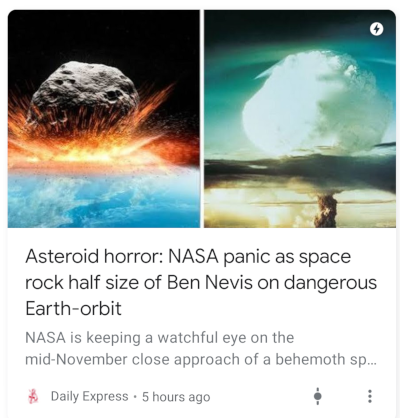So the press release was written in the obscure, little-known language of… French? “New exhibit” is not exactly an obscure phrase.
I thoroughly agree, tripping over something as simple as that says some things about reporting standards. I was not offering it as an example of a particularly high bar to clear.
Yeah. There’s been a lot of noise about how journalists are so pressured by deadlines they don’t have time for this and that, but it’s more important than ever they be accurate.
You mean there’s a difference between the obscure, little-known word “exposition” and the obscure, little-known word “espèce”? Who knew? 
Okay, I knew the words, but now that you write it that way, I wonder if someone who didn’t speak French retyped the release into a translator app wrong. It’s easy to jump a line or two when you don’t know what you’re transcribing.
Perhaps, but oh my! The meaning of “exposition” is very nearly the same in both languages. That’s the thing: English and French are chockablock with cognates.
They’re also rife with faux amis (e.g. sensible, partition, caution, extra).
Yeah, there are faux amis, but even they are often decipherable from the common word roots. Some of those you list (partition, extra) actually share the English meanings, but add a definition (“score”, “superlative” respectively).
Translation makes things strange, though. I know someone who went back to the old country in their early 20s after moving to Canada as a child. She still spoke her mother tongue, but she was nervous about traveling abroad without her parents for the first time.
She was taking the train to visit some relatives, and checked each station as the train pulled in because she wasn’t sure how many stations before she had to disembark.
It took three stops before she realised she was reading the regular noun “station” as the proper name of each station. Fortunately she hadn’t missed her stop yet  .
.
Heh! Not being in contact with the maternal language makes things strange.
I had a friend back in Concordia University who was born as part of the Greek community in Alexandria, moved to Paraguay as a young girl, and thence to Montreal. She thus had a good assortment of languages available to her: Greek, Arabic, Spanish, French and English.
I recall she visited Greece for the first time while she was at Concordia. I recall she came back to Canada indignant - she had been told in Greece that she spoke Greek like an Armenian. 
All you have to do is find a way to apply the Banach–Tarski theorem to a real-world solid object!
Speaking of 52 = 53, I found this Quanta article interesting – that is till it got way over my head (instead of the usual over my head).
Increasing visual effects, but good news for coral survival:
Google News regularly encourages me to get my science news from The Sun and The Daily Express.
I’m pretty sure they end up putting a (much too) heavy bias on sites you’ve gone to once or twice for other things. I don’t see many purely junk sites in my feed, though I get a lot of “science news” suggestions for an “International Business Times” site ever since I clicked on an article there that claimed to have information about a cell phone.
It does end up giving me far, faaaar too many Fox News articles about politics, though. And occasionally a flurry of articles claiming some upcoming asteroid pass has a chance of hitting the planet, haven’t quite figured out why it decides to push that stuff at me yet.
I’m getting fed stories on black holes, which is fine, because I’ve been trying to catch up on all the new developments and discoveries announced lately. (I’ve also been watching videos on YouTube from PBS SpaceTime, so there’s definitely a connection there too.)
I must have been consulting the Daily Express for its entertainingly bizarre takes on Brexit. And now my curiosity is a part of my permanent record. Oops.
Scary thought.
For example:

Because “half the size of a mountain in Scotland” is something everyone can relate to. And, waaaaaaay down at the end of the article, they bury this:
Despite this space rock making a close approach to Earth, it is very unlikely that it could threaten our home-world.
(I’m not even bothering to link the article, since 1. it’s clearly horrible click-bait, and 2. it’s one of those sites that claims that it can’t possibly let you read the article unless you agree to the cookie/privacy policy of eleven different third-party sites, because “these cookies are necessary for the website to function” and “Without this type of technology, our Services won’t work properly”. Which is a whole “possibly untrue” category of its own…)
Boy, I feel bad for this Ben guy, getting dragged for his weight in an article that’s supposed to be about an asteroid…
